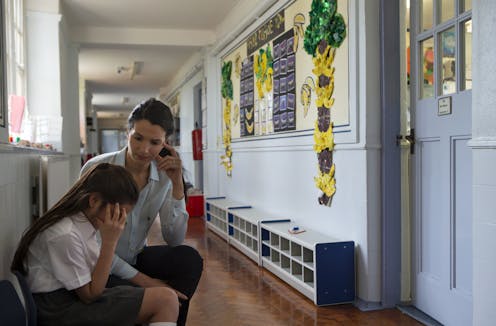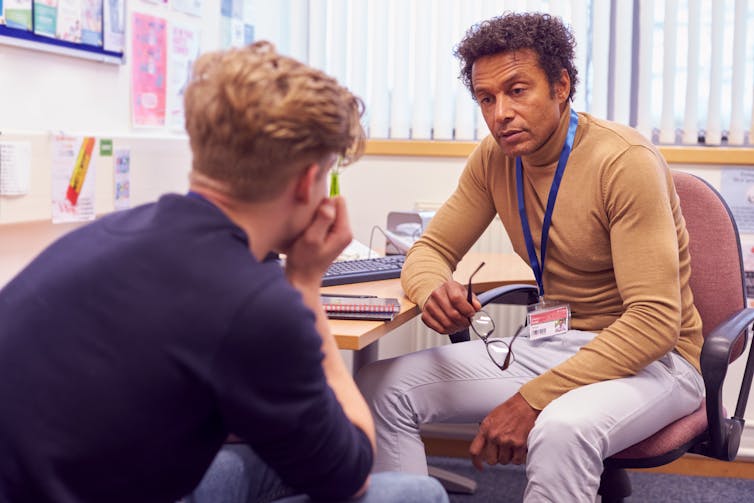Source: The Conversation (Au and NZ) – By Brian Moore, Lecturer, Educational Psychology & Child Development, School of Education, Charles Sturt University

Shutterstock
Schools are an obvious place to do mental health work with young people. This is important, as about one in seven young Australians are diagnosed with a mental illness. This includes issues like psychological distress, anxiety, depression, school refusal, and complex trauma.
However, the ratio of school counsellors and psychologists to students means they can be very difficult for students to access. For example, there is about one counsellor for every 750 students in NSW public schools.
Consequently, teachers are often seen as front-line mental health providers by default. This has particularly been the case since the start of the pandemic.
But what is reasonable to expect of teachers when it comes to students’ mental health?
Read more:
‘It’s almost like a second home’: why students want schools to do more about mental health
Training is patchy
There is little consistency in the types of mental health services provided by schools or who actually performs this role.
Many schools have counsellors or psychologists, while others may have access to Department of Health and non-government staff who might come into schools to deliver a specific program or provide targeted support to at-risk students. But availability is a huge issue.
Meanwhile, there is no consistent mental health training for new teachers.
Many teacher education programs do not explicitly address mental health. If it is included, it often occurs as a single day of training, or sometimes features as part of other subjects. The level of training a student receives is often up to a lecturer’s interest in mental health rather than identified needs.
Even then, the focus is also often around supporting student wellbeing, rather than addressing mental illness.
There are professional development training and resources on mental health for existing teachers. But again, these are not consistently applied.

Shutterstock
Teachers are not confident
Given inconsistent and potentially inadequate training, it is unsurprising that while teachers take mental health seriously, many report low confidence about supporting their students’ mental health. In one 2017 study in the United States, almost 50% of teachers reported they had received inadequate mental health training, and 85% indicated they would like further training in mental health issues.
Even experienced mental health professionals report feelings of incompetence when addressing their clients’ mental health needs.
So, if qualified mental health practitioners feel this way, our expectations of teachers in the mental health space should be carefully considered.
What can teachers do?
Teachers do of course have a valuable role in supporting student mental health. But this needs to occur in the context of teaching.
They can do this by developing a positive, supportive learning environment that supports students’ individual needs and strengths. Teachers can provide opportunities to build positive student identity and self-esteem by providing genuine opportunities for students to succeed in the classroom. Teachers can have positive relationships with their students and foster healthy peer interactions.
It is important teachers know how to identify students with possible mental health problems as well as being aware of potential referral options (noting lack of availability is an issue). It is also important teachers develop and maintain open and honest communication with caregivers.
What more can be done?
Clearly, much more needs to be done around mental health in schools. It makes sense to make greater provision for funding and training of school counsellors and psychologists. We should also examine ways of better integrating mental health services like the Department of Health and Headspace in schools.
However, with supply and recruitment difficulties these are not straight forward solutions.
A consistent national approach to the mental health curriculum in teacher training is urgently needed.
Critically, the role of teachers in school based mental health services needs to be clearly defined to manage expectations and support students more effectively.
Teachers belong to the helping category of professionals and are inclined to support their students in every way they can. They need to be equipped to provide assistance with learning that can take mental health into account.
However, policy makers and school communities need to remember, teachers are not trained as mental health practitioners.
If this article has raised issues for you or someone you know, you can call Lifeline on 13 11 14 or Kids Helpline on 1800 55 1800.
![]()
Sarah Redshaw is elected to the Blue Mountains City Council as a Greens councillor and is a member of the party.
Brian Moore does not work for, consult, own shares in or receive funding from any company or organisation that would benefit from this article, and has disclosed no relevant affiliations beyond their academic appointment.
– ref. Students’ mental health is a big issue for schools – but teachers should only be part of the solution – https://theconversation.com/students-mental-health-is-a-big-issue-for-schools-but-teachers-should-only-be-part-of-the-solution-200993




